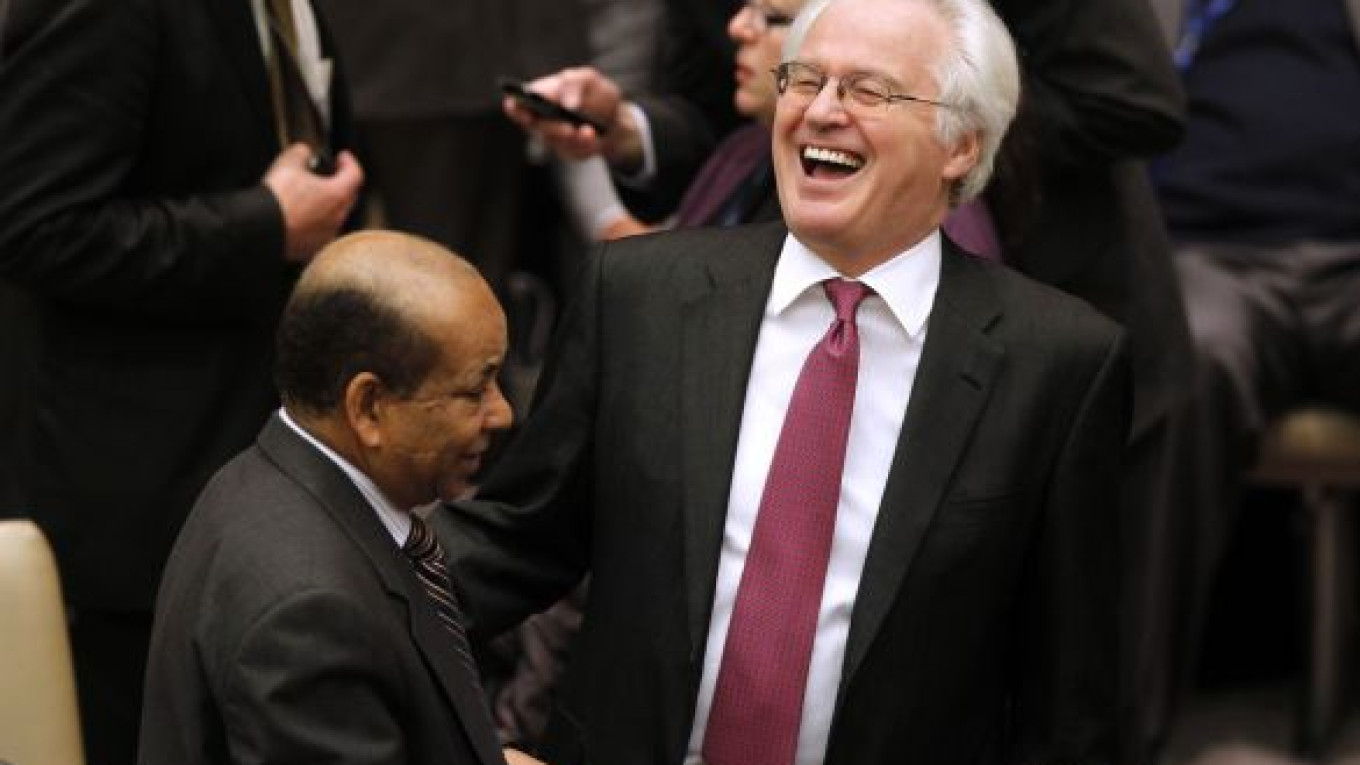U.S. Defense Secretary Robert Gates will arrive on Monday for talks expected to be dominated by the launch of UN-sanctioned military strikes on Libya over the weekend.
Gates' visit — likely his last because he intends to quit sometime this year ?€” was scheduled for Sunday but postponed because of the recent developments on Libya.
The agenda included topics such as arms control, missile defense and the situation in Iran, but now "the fast-moving developments in the Middle East" has also been added, Pentagon spokesman Geoff Morrell told reporters Friday in Washington.
But Gates faces a tough task because Moscow enjoys what a one analyst dubbed the "Chinese position," refusing to support either side and even cautiously denouncing the Western military operation, dubbed Odyssey Dawn.
Gates is to speak with Defense Minister Anatoly Serdyukov on Monday and President Dmitry Medvedev on Tuesday, the Kremlin said in a statement, without elaborating on the agenda.
Meanwhile, the Foreign Ministry released several statements criticizing the airstrikes that Western powers have directed at the forces of Libyan ruler Moammar Gadhafi.
"Moscow regrets this armed operation," ministry spokesman Alexander Lukashevich said Saturday. He also called a UN Security Council resolution authorizing the attacks a "hastily approved" move. Russia abstained in the UN vote Thursday.
The UN no-fly mandate, intended to protect civilians, should not be abused, Lukashevich said in a separate statement Sunday, citing reports by Gadhafi-controlled television that said at least 48 civilians in the capital, Tripoli, had been killed by a strike.
A popular uprising sank into a de-facto civil war in Libya since mid-February, with rebels demanding the immediate ouster of the 68-year-old Gadhafi, in power since 1969.
After initial successes by the rebels, based in the eastern city of Benghasi, Gadhafi forces launched a counteroffensive, relying on their vast air superiority. The death toll was estimated at anywhere between 1,000 and 10,000, but international observers feared it would skyrocket if Gadhafi carried out plans to storm Benghasi.
The siege of Benghasi prompted the UN Security Council to approve the long-stalled no-fly zone over Libya, authorizing UN member states to use force to impose it. Of the 15 members of the council, five ?€” Russia, Brazil, China, Germany and India ?€” abstained during the vote, while the rest supported the motion.
France was the first to strike at Gadhafi's forces on Saturday, followed by Britain and the United States.
U.S. Chairman of the Joint Chiefs of Staff Mike Mullen said Sunday that the no-fly zone was installed but warned that the conflict could deteriorate into a stalemate.
Russia has taken a "very advantageous" position by not explicitly supporting either the West or Gadhafi, foreign policy analyst Fyodor Lukyanov said Sunday.
"Russia has taken its traditional so-called 'Chinese position,' offering no support and saying that it doesn't concern us," Lukyanov, editor-in-chief of Russia in Global Affairs journal, said in a reference to Beijing's common stance on global politics.
But Gates is bound to raise the issue during his trip to Russia, Lukyanov said by telephone.
He agreed with Mullen that the conflict is far from over. "The no-fly zone doesn't spell the end of the operation. The end game will only be reached when Gadhafi is toppled," Lukyanov said.
Russia supported a UN resolution imposing sanctions on Gadhafi's regime for the use of lethal force against his opponents in February. In a largely ornamental gesture of solidarity with the West, Medvedev also banned Gadhafi and his family from Russia earlier this month.
But in an indication of a possible split over Libya, Medvedev fired Russia's ambassador to Libya, Vladimir ??hamov, Interfax reported Saturday. No explanation was provided, and a Kremlin source told Itar-Tass that Chamov had represented Russian interests "inadequately."
A Message from The Moscow Times:
Dear readers,
We are facing unprecedented challenges. Russia's Prosecutor General's Office has designated The Moscow Times as an "undesirable" organization, criminalizing our work and putting our staff at risk of prosecution. This follows our earlier unjust labeling as a "foreign agent."
These actions are direct attempts to silence independent journalism in Russia. The authorities claim our work "discredits the decisions of the Russian leadership." We see things differently: we strive to provide accurate, unbiased reporting on Russia.
We, the journalists of The Moscow Times, refuse to be silenced. But to continue our work, we need your help.
Your support, no matter how small, makes a world of difference. If you can, please support us monthly starting from just $2. It's quick to set up, and every contribution makes a significant impact.
By supporting The Moscow Times, you're defending open, independent journalism in the face of repression. Thank you for standing with us.
Remind me later.


